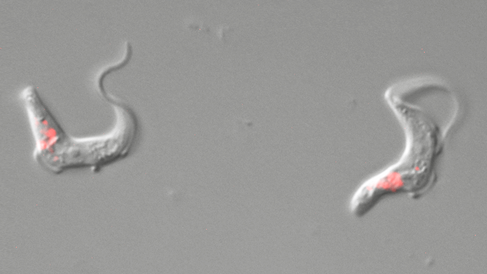
Paula MacGregor, Mark Carrington and collaborators have published an article in PLOS Neglected Tropical Diseases that demonstrates that a class of oncology therapeutics can be repurposed to kill African trypanosomes.
Trypanosomes are deadly, single-celled parasites that are injected into the bloodstream of humans, domestic livestock and wildlife when they are bitten by infected tsetse flies. The human and animal diseases that they cause have widespread impact in sub-Saharan Africa, leading to thousands of human deaths and significant human suffering through reducing the productivity of livestock.
Antibody-drug conjugates (ADCs) are a class of biological therapeutics that are increasingly being developed for oncology and infectious disease. In their new study, Dr Paula MacGregor and Professor Mark Carrington, along with their collaborators at MedImmune, Spirogen, the London School of Hygiene and Tropical Medicine and the University of Oxford, demonstrate that an oncology-style ADC that targets an African trypanosome cell surface receptor is internalised by the parasite and leads to cell death. A single, low, sub-oncological dose of this ADC led to complete cure of the standard model of disease. This suggests that novel therapeutics against protozoan pathogens could be developed by piggy-backing on the considerable investments being made for oncology ADCs, providing a far-reaching opportunity for the rapid development of new anti-parasitic drugs for the targeted killing of a wide range of pathogens that cause disease worldwide, especially in developing countries.
This work was funded by an MRC project grant to Mark Carrington and Matt Higgins. Paula MacGregor is a BBSRC David Phillips Fellow.
